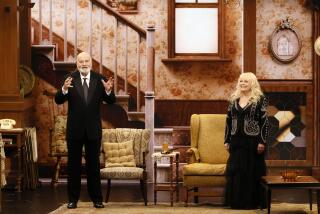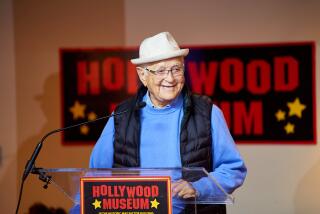From the Archives: Lee Remick; Actress’ Long Career Spanned TV Dramas, Stage, Film
Lee Remick, the alluring actress who gained fame as the haunting alcoholic in “The Days of Wine and Roses,” died Tuesday at her Brentwood home of cancer.
The versatile performer—known for her talent in blending the innocence of youth and the sensuality of womanhood—was 55.
Tumors had been found on her kidneys and lungs in 1989 after she fell ill while making a film in France.
“This has been a slow slide and it finally came about,” her publicist Dick Winters said. He added that Miss Remick had undergone only physical therapy to cope with the cancer in recent months.
Relatives were at her bedside when she died, Winters said.
In her final public appearances, a very frail Miss Remick received a star on the Hollywood Walk of Fame on April 29. A week later, she again appeared pale and weary when she was honored by the Winston Churchill Society in a ceremony at the Queen Mary in Long Beach. She had played Churchill’s mother in a TV special.
Her diversity was evident throughout what proved a lengthy career for a woman who died so young. From her Broadway stage debut in 1953 to her final appearance in “Love Letters” at the Canon Theater in Beverly Hills last summer, her characters covered a wide range.
Besides playing the dipsomaniac mate of Jack Lemmon in the 1962 “Wine and Roses,” which brought her an Academy Award nomination, she was a nervous wreck in “The Women’s Room,” a tough piano coach in “The Competition,” a nymphomaniac in “The Detective” and a rape victim in the remake of “The Letter.”
Most recently, Miss Remick starred as the indifferent mother to Marlee Matlin in the 1989 television movie “A Bridge to Silence.”
The actress appeared in 28 motion pictures, including “A Face in the Crowd,” “The Long Hot Summer,” “Experiment in Terror,” “Wild River,” “Sanctuary,” “The Wheeler Dealers,” “Travelin’ Lady,” “Anatomy of a Murder,” “Tribute” and “The Omen.”
In addition to Lemmon, her leading men included Andy Griffith, Paul Newman, Orson Welles, James Stewart, George C. Scott, Montgomery Clift, Gregory Peck, Burt Lancaster, Steve McQueen and Frank Sinatra.
They remembered her with fond admiration:
Lemmon said: “Knowing and working with Lee will always remain one of the most joyous experiences of my life. She was precious, and certainly the embodiment of grace.”
Peck, who played Miss Remick’s husband in the 1976 movie “The Omen,” said the actress possessed “a rare quality, which I would call a depth of womanliness. She played her on- and off-screen roles with an open heart, an open mind, keen intelligence and honest emotion.
“She made all of her leading men look good,” Peck said. “I will never forget this clear-eyed Yankee girl.”
Charles Bronson starred as a Soviet agent opposite Miss Remick in the 1977 espionage thriller “Telefon.”
“I am so sorry she is gone. She was a beautiful, warm and giving individual as well as a very unselfish and professional actress.”
Actress Angela Lansbury, who starred with Miss Remick in “Anyone Can Whistle,” an early but short-lived Stephen Sondheim musical, said she “was such a brave and extraordinarily positive-thinking person. She never gave into the cancer for one second.”
Unlike many of her peers, Miss Remick moved frequently between motion pictures and television.
“I just look for the stuff that interests me. And I don’t like to repeat,” she said in a 1988 interview with the Associated Press. “That’s the nature of the biz. Once you’ve done something well, they think, ‘Ah, that’s what she does,’ and they keep sending you the same script over and over again.”
She said at the time that she was doing television roles because “I haven’t been offered anything in a feature in a few years that has come close to giving me that kind of fertile ground to play with.”
She was particularly proud of “playing a lot of real people on TV,” she said in a 1987 interview.
Besides Churchill’s mother, in “Jenny, Lady Randolph Churchill” for which she was nominated for an Emmy and Golden Globe Award, she was a former First Lady in “Eleanor—in Her Own Words: A Tribute to Eleanor Roosevelt.” In “Nutcracker: Money, Madness and Murder,” Miss Remick starred as Frances Bradshaw Schreuder, the socialite who was convicted of persuading her 17-year-old son to kill her father. And she was British driver Kay Summersby, who was linked romantically to Gen. Dwight D. Eisenhower, in “Ike, the War Years.”
Miss Remick was born in Boston. Her father was a department store owner and her mother was an actress. She told The Times’ Charles Champlin last year that she had intended to be a dancer but “I wouldn’t have been that good.” She credited the training and discipline of dance, however, with much of her acting successes.
She was attending Miss Hewitt’s School and studying dramatics when someone—she didn’t remember who—encouraged her to try out for a Broadway play called “Act Your Age.” She added two years to her age, which got her a job but didn’t help the play, which bombed.
She did summer stock with Rudy Vallee and in 1953 returned to New York to enroll in Barnard College. But by then the theater had captured her and she began to appear in such early television dramas as “Playhouse 90,” which originally produced “The Days of Wine and Roses,” “Philco Playhouse” and “Robert Montgomery Presents.”
Elia Kazan saw her in a TV play called “All Expenses Paid” and asked her to be Betty Lou, the predatory cheerleader in his acclaimed movie “A Face in the Crowd.”
She was just 22.
Her performance in the 1966 Broadway play “Wait Until Dark” brought her a Tony Award nomination. In 1974, she was cast in a London production of “Bus Stop.”
After her marriage to British producer Kip Gowans in 1970, she lived for many years in London but sold that home and moved to Brentwood to be closer to her film roles.
She was almost shy and retiring in person, and somewhat mystified by her fame.
She liked to tell of the time a woman was walking back and forth near her as she was eating lunch. Finally the obvious fan got up her nerve and came to Miss Remick’s table.
“You’re Lee Remick aren’t you?”
“Yes,” was the response.
“I thought so,” said the fan with obvious satisfaction. “You look so much like her and she’s so pretty.”
“It was almost mystical,” Miss Remick said later. “Then I realized that she was separating the me she saw on the screen from the me she was seeing in person.”
Besides her husband, Miss Remick is survived by her daughter, Kate Colleran Sullivan, and her son, Matthew Remick Colleran, from a previous marriage to TV director William Colleran. Other survivors include her mother, Pat Packard, and stepdaughters Justine Gowans Solly and Nicola Gowans.
A memorial service is pending.
From the Archives: Classy Film Feminist Had Brains, Beauty, That Voice
From the Archives: Paul Newman dies at 83; leading man of film and philanthropy
From the Archives: Bette Davis Dies in Paris at 81
From the Archives: Nat ‘King’ Cole dies of cancer at 45
From the Archives: Jack Lemmon, Everyman Star, Dies
More to Read
Start your day right
Sign up for Essential California for the L.A. Times biggest news, features and recommendations in your inbox six days a week.
You may occasionally receive promotional content from the Los Angeles Times.






